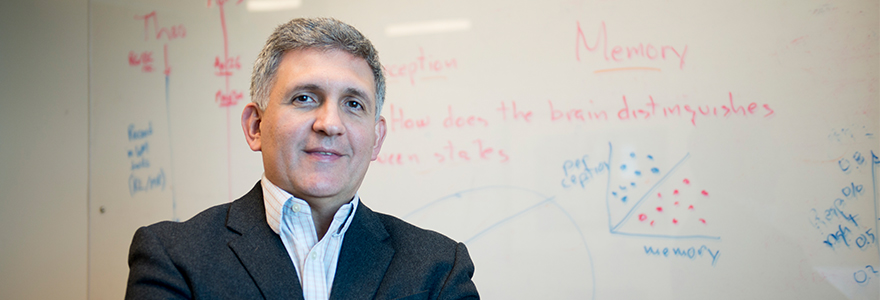Eye movement opens door to memory formation
By Crystal Mackay, MA'05
New research has shown that the ability to move our eyes has a direct impact on our ability to encode memory. The hope is that this information will help inform further research into understanding diseases that influence memory formation like Alzheimer’s disease .
The research team, led by Dr. Julio Martinez-Trujillo, used animal models to study how eye movement influences brain signals in the hippocampus, a small curved portion of the brain responsible for new memory formation and recall. Because the hippocampus is located deep in the brain, not all brain signals make it there.
“Think of it
Dr. Martinez-Trujillo says in this way, only the most important information is encoded into the hippocampus for long-term memory formation. “When you move your eyes in this way, it is called active-sensing. You are looking at something visual that you perceive to be important.”
Interestingly, not all animals have foveas. He says other animals enact active sensing in other ways, for example through the vibrations in their whiskers.
The study, published in the journal Hippocampus, supports the hypothesis that eye movement serves as a facilitator to activate the hippocampus to accept sensory input. Dr. Martinez-Trujillo says that this concept is not new, but his group is the first to provide the evidence by specifically tracking the signals in the brain.
“There are other research groups looking at the link between eye movements and memory formation, for example in patients with dementia,” he said. “What we understand now is that if you don’t have the right pattern of eye movements, your memory formation may be compromised.”
This paves the way for future research looking at how training eye movement to grab relevant information may be able to improve memory for diseases like Alzheimer’s or schizophrenia
Dr. Martinez-Trujillo points out that some studies have used deep brain stimulation as a means to improve memory formation in patients with Alzheimer's. However, the results have been variable and inconclusive. This research, demonstrating that eye movement may open the door for signals entering the hippocampus to enact memory formation, suggests that stimulation trials may need to be coupled with eye movements in order to have an impact on memory formation.
It also demonstrates that conditions affecting the eye-movement system may have an impact on memory formation.



